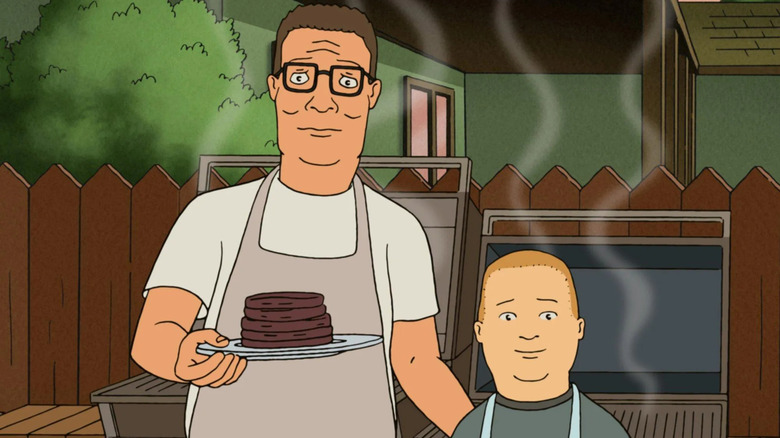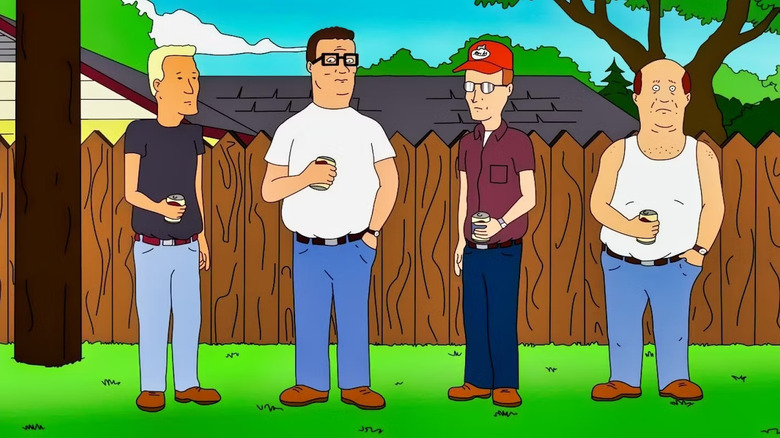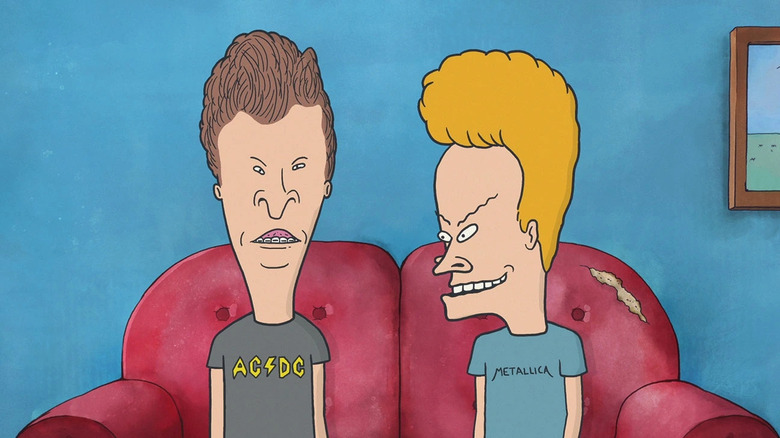How A Paper Route And Couple Of Beers Helped Inspire King Of The Hill
The origins of Mike Judge's "King of the Hill" would make its protagonist Hank Hill proud. The satirical animated series introduced us to a loveable collection of rednecks in Arlen, Texas. It debuted on Fox in 1997 and ran for 13 seasons. The timing of its arrival was impeccable. As we rushed toward the new millennium in the late 1990s, the Internet, cell phones, and satellite TV would change the face of mass communication. The tragedy of 9/11 and a seemingly unending war in the Middle East were right around the bend. Old ideals were giving way to a new generation.
The world was about to change significantly, and it was surprisingly calming to watch Texas everyman Hank Hill grapple with those changes along with us. As a good-hearted baby boomer with often outdated values, he was a character that Gen X could laugh at — and eventually with — as we inched closer to becoming Hank Hill ourselves. His desire for simpler times would soon become our collective longing.
But Judge's idea for the series didn't spawn from a major social shift in the 1990s. In typical Hank Hill fashion, it was much simpler than that.
'Two bubbas sitting around drinking beer'
Mike Judge had the basic concept for "King of the Hill" from the time he was in college, where he'd act out what would eventually become parts of the show with a friend. "I think as far back as in college a good friend of mine and I used to sort of do a bit of like two bubba's sitting around drinking beer and talking about what's in the news or whatever," Judge said in a 2012 interview with IGN.
But the inspiration for the show's characters might have occurred even earlier. It was Judge's work as a paper boy that exposed him to people that would eventually become the animated residents of Arlen. Judge said:
"I had a paper route that was sort of in a blue-collar neighborhood with lots of Texas transplants, so early on I had these kinds of characters around me. But I think when I lived north of Dallas I had really a pretty good neighborhood; everyone took care of each other, helped out with each other's lawns."
The animator explained that it all came together when drawing a panel cartoon. "I just had this image of just four guys with beers standing out in front of the fence, kind of like I used to see when I'd look out my kitchen window," Judge said. "And I just drew them all saying, 'Yep, yep, yep.' That's still basically the drawing you see at the beginning of the show, is those four guys and their beers. That was really the seed of the idea."
It was clear from early on that Judge had a talent for creating real people in an otherwise fabricated world.
Judge's characters are all of us
From the beginning, Milke Judge had the ability to reflect on what was happening in the cultural zeitgeist through his characters. The animator got his break in 1993 with the massively popular MTV series "Beavis and Butt-Head." The series followed the adventures of two latchkey juvenile delinquents who formed their worldview by watching television. There's a sad irony that much of what fills today's MTV airwaves is the very thing Beavis and Butthead critiqued.
Roger Ebert noted Judge's talent for character development with his review of "Beavis and Butt-Head Do America." The critic wrote:
"Mike Judge's characters reflect parts of the society that produced them. To study 'Beavis and Butt-Head' is to learn about a culture of narcissism, alienation, functional illiteracy, instant gratification, and television zombiehood."
With "King of the Hill," Judge used the fish-out-of-water trope to create what The Atlantic claimed appealed to conservatives and liberals alike, and one of the last to do so. Film and television often serve as a reflection of our fears and worries, but usually in the form of horror or suspense. With "King of the Hill" Mike Judge created a satirical take on a rapidly changing society using Hank Hill as an effective stand-in for all of us.
What might Hank Hill think of everything that's happened in the decade since the show ended, I wonder? I echo his season 4 words of wisdom to his son: "Bobby, some things are like a tire fire. Trying to put it out only makes it worse. You just gotta grab a beer and let it burn."


